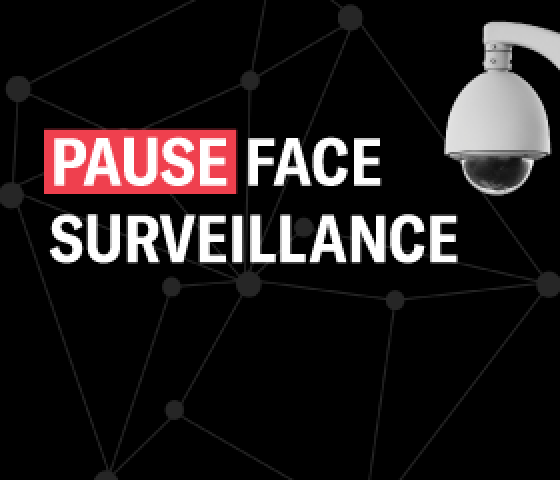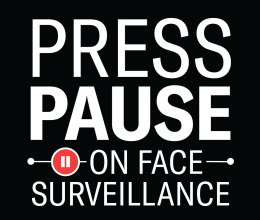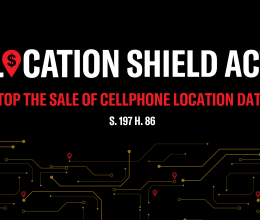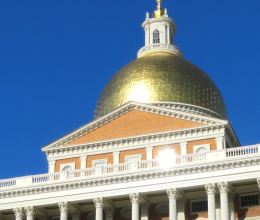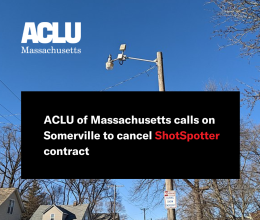Nine-in-10 (91%) Massachusetts voters think the Commonwealth needs to regulate the government’s ongoing use of face surveillance technology, according to a first-of-its-kind poll released today by the ACLU of Massachusetts.
Seventy-nine percent (79%) of voters support a moratorium to press pause on government use of face surveillance technology, which is currently unregulated in Massachusetts.
Face surveillance systems are computer programs designed to analyze images of human faces to identify and track people at a distance, without their knowledge or consent. Private companies marketing this technology to government agencies boast that it can monitor people in real-time, reconstruct past movements from video footage, perform “emotion detection,” and uniquely identify hundreds of individuals from a single photo. According to the poll, 76 percent (76%) of voters do not think the government should be able to monitor and track people with this technology.
“Face surveillance technology gives the government unprecedented power to track who we are, where we go, what we do, and who we know,” said Carol Rose, executive director of the ACLU of Massachusetts. “This technology threatens to create a world where people are watched and identified as they attend a protest, congregate at a place of worship, visit a medical provider, and go about their daily lives. It’s time to press pause in Massachusetts.”
The poll’s release marks the launch of the ACLU’s new “Press Pause on Face Surveillance” campaign, which will include a series of public education events and awareness-building efforts about the civil liberties concerns posed by face surveillance technology and the need to pass a statewide moratorium on the government’s use of the technology.
“In the U.S., private companies are preying on police departments, encouraging them to adopt inaccurate, potentially racially biased software in the dark to test on unsuspecting communities; abroad, the technology has been deployed to systematically control a religious minority population,” said Kade Crockford, director of the Technology for Liberty Program at the ACLU of Massachusetts. “Massachusetts must chart a different course to ensure technology like face surveillance doesn’t get out ahead of our basic rights.”
An ACLU-backed bill currently before Massachusetts legislators on Beacon Hill would establish a statewide moratorium on unregulated government use of face surveillance and other biometric screening technologies until the legislature imposes checks and balances to protect the public’s interest. According to the poll, the first-ever in Massachusetts about the public perception of government use of face surveillance technology, the moratorium enjoys wide bipartisan voter support: Eighty-four percent (84%) of Democrats, 82 percent (82%) of Independents, and 50 percent (50%) of Republicans favor the moratorium currently before Massachusetts legislators.
“Never before has technology enabled total and persistent government tracking of every person’s every movement, habit, and association,” said Senate Majority Leader Cynthia S. Creem (D-Newton), bill sponsor. “We don’t have to sit by idly and wait while the technology further outpaces our civil liberties protections—and we won’t. Massachusetts can and must lead the nation by passing a moratorium to protect individual privacy, racial and gender justice, and freedom of speech. We have a responsibility to ensure the freedoms we hold dear are secured for future generations, and that’s why we are fighting to make this bill law.”
In Somerville, the City Council is considering an ordinance that would prohibit government use of face surveillance technology. Somerville is the first East Coast city to consider such a prohibition.
“Massachusetts voters overwhelmingly support our moratorium legislation, with good reason,” said Representative Dave Rogers (D-Middlesex), bill sponsor. “Americans expect to be able to go about our lives without our every move being tracked by the government. Before this technology becomes widespread and enables that kind of chilling surveillance, we need to press pause. The moratorium gives us the space we need to seriously deliberate over how we ought to responsibly approach this technology, and give us a chance to bring all stakeholders and interested parties to the table, which is our job as legislators. I look forward to working with my colleagues and the Governor to making this law.”
The survey—conducted by Beacon Research, polling experts who have surveyed the state’s voters for dozens of campaigns and initiatives—interviewed by telephone 503 Massachusetts registered voters. The poll has a margin of error of +/-4.
